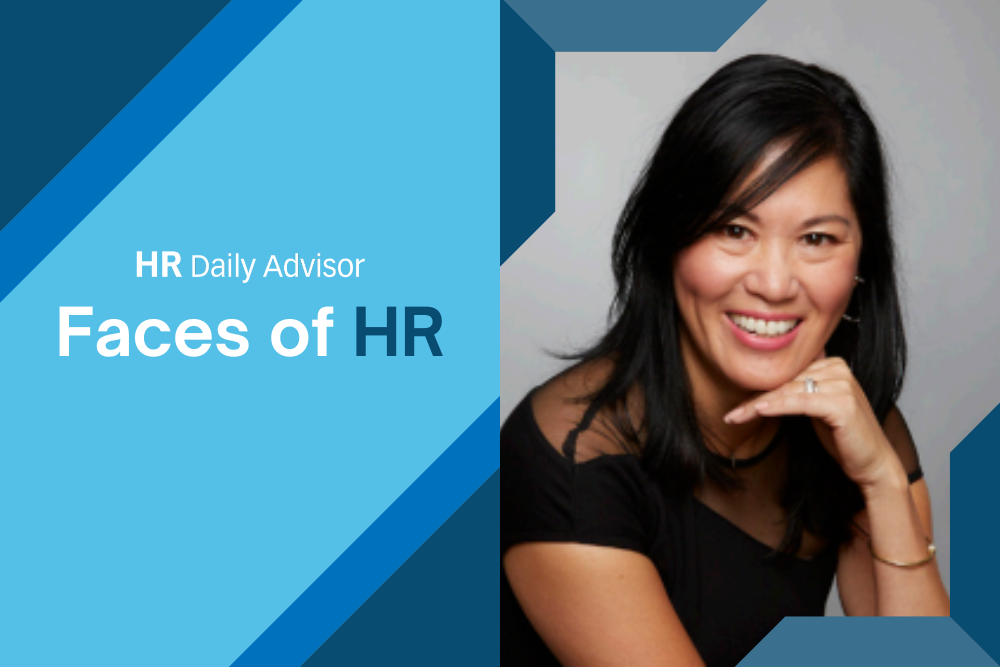Meet Angela Cheng-Cimini, SVP, Talent and Chief Human Resources Officer (CHRO) at Harvard Business Publishing, which focuses on improving business management practices through myriad resources, including articles, books, case studies, simulations, videos, learning programs, and digital tools. She joined the publishing company in 2021, bringing more than 30 years of HR experience across multiple sectors and various company life stages to her role.
Cheng-Cimini has had an impressive career, and like many of the HR professionals we feature in this column, she didn’t always have HR on her radar.
“I credit my father for identifying the right major for me at Cornell University – Industrial and Labor Relations,” she recently shared with HR Daily Advisor. “It had and still has a very strong HR curriculum. I gravitated to the discipline and have never looked back.”
Hats off to Cheng-Cimini’s father for his guidance. In her role as CHRO, she leads efforts to develop a talent road map that not only supports the publishing company’s business strategy but also creates a thoroughly engaged and diverse workforce.
Additionally, Cheng-Cimini passionately uses her servant mindset, volunteering for Ascend as HR Vertical co-lead and serving on the Alumni Board of Directors for Cornell University and an HR Venture Adviser for SemperVirens, an early-stage venture fund that invests in technology transforming health care, work, and financial wellness. She is also board director for the T. Howard Foundation, a mission-driven organization dedicated to increasing diversity in the media industry.
In our latest Faces, meet Angela Cheng-Cimini.
Who is/was your biggest influence in the industry?
There isn’t a single person. All throughout my career journey, I have had the support of many people along the way. Some were my superiors, others were colleagues, and still others were those whom I managed. I learned what good and bad leadership looks like; how to accept critical feedback; how to deliver hard news and preserve the dignity of the other; and, most recently, how to exercise self-care. There is wisdom to be found everywhere if you are willing to look for and listen to it.
What’s your best mistake, and what did you learn from it?
My best mistake was during one of my first training sessions. I was determined to stick to my agenda, although it was clear the audience had other things on their mind to discuss. My failure to read the room was a disappointment for everyone—for me because I wasn’t connecting and for them because I wasn’t hearing them. Now I try to listen more than I speak. It builds trust and credibility faster than my taking up airtime. The only thing better is to deliver on my commitments.
What’s your favorite part about working in the industry? What’s your least favorite part, and how would you change it?
My favorite part is the ever-changing landscape of the work—through the tech bubble burst, the pandemic, the Great Resignation, the revival of organized labor, and now the impact of artificial intelligence (AI). Each day is different from the last. There is a never-ending opportunity to bring impact to an individual or to an entire organization.
It sounds like, through your experience, you really care about people, and you want to help them feel safe and comfortable, which is important in the industry. Please elaborate here.
I have the experience of being the “Only” in the room: the only woman and the only person of color. The energy that is expended to assimilate is better used toward innovation and creativity—the very things that come from being unique. I feel a deep obligation to ensure that others, no matter their origin story, can find a place where they are included and can bring their A-game as much as possible.
How can HR most effectively demonstrate its value to the leadership team?
I learned very early on that HR professionals must understand the business. How do we make/lose money? What is our market position? Who are our competitors? What’s the 3-year plan? HR can then lend its expertise to enable the organization to perform through its people. Do we have the right culture? Do we have the right skills? How should we be investing in talent to future-proof the business? HR can’t be seen as pushing an agenda that stands alone; it must be seen in alignment with the strategic priorities.
Where do you see the industry heading in 5 years? Or, are you seeing any current trends?
With all the data that is available about us personally, organizations need to become equally fluent with how they deploy all their information about their people and put it to good use. Increasingly, employees are demanding a more bespoke experience, one that is customized to their needs and ambitions. I call it “hyperpersonalization.” Individuals want their compensation to match their unique skills and contributions, they want to work where they can be most productive, they want to chart their own career path (not take the one the company says is next), and they want to learn in the mode that is most effective for them. Employers must catch up and deliver. With the advent of AI, this data is becoming easier, cheaper, and faster to acquire and interpret.
What are you most proud of?
I have entered the phase of my career where I feel I have something meaningful to give back. I am volunteering for groups that support the AAPI (Asian-American and Pacific Islander) community and their members at all career stages. I am also really enjoying speaking engagements that allow me to share with others in HR the great work that my team is doing to advance learning, culture, and inclusion.
Do you have any advice for people entering the profession?
Lead with your conscience, and stick to your values. The work can be extremely challenging and sometimes incredibly lonely. However, if you demonstrate respect, humility, and moral strength, you’ll find yourself supported by others and derive the energy to keep at this gratifying work.


